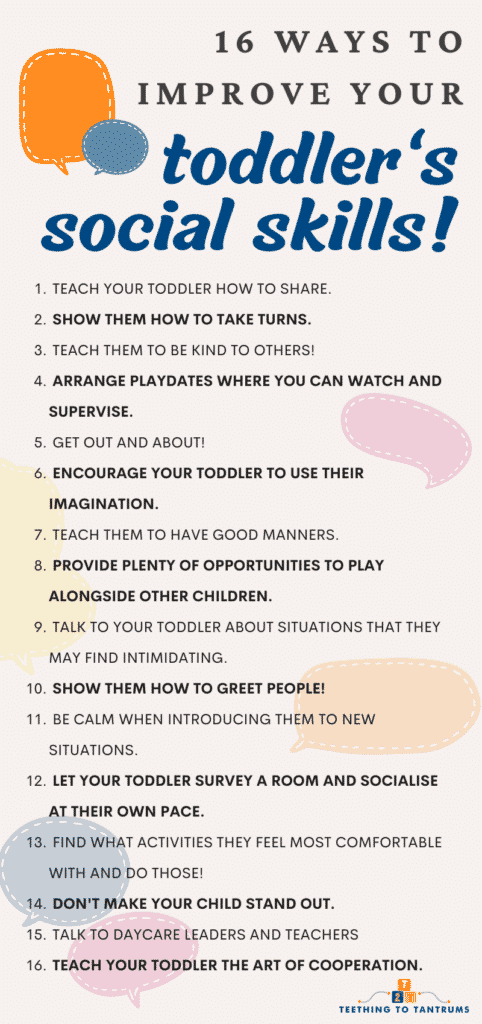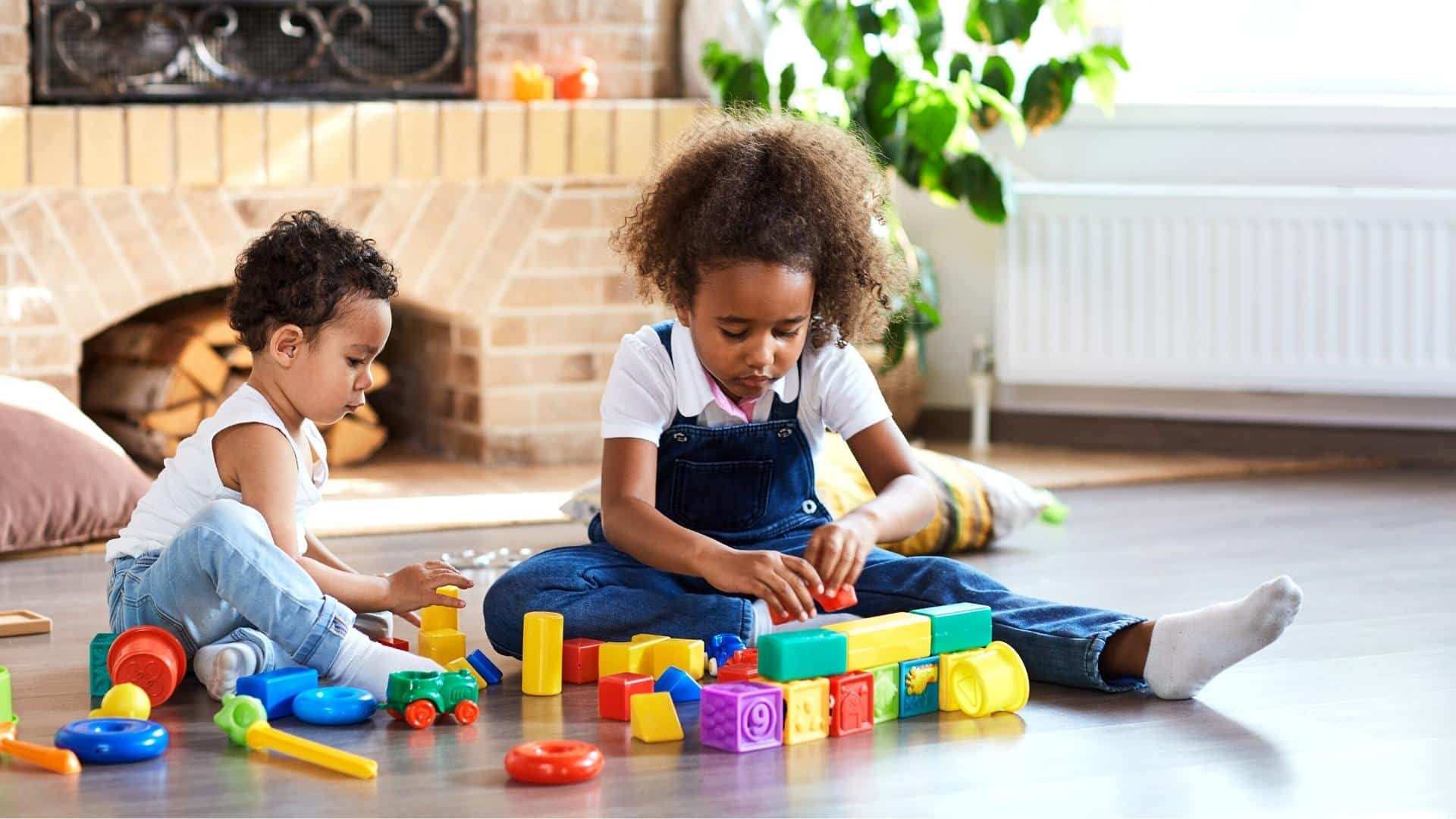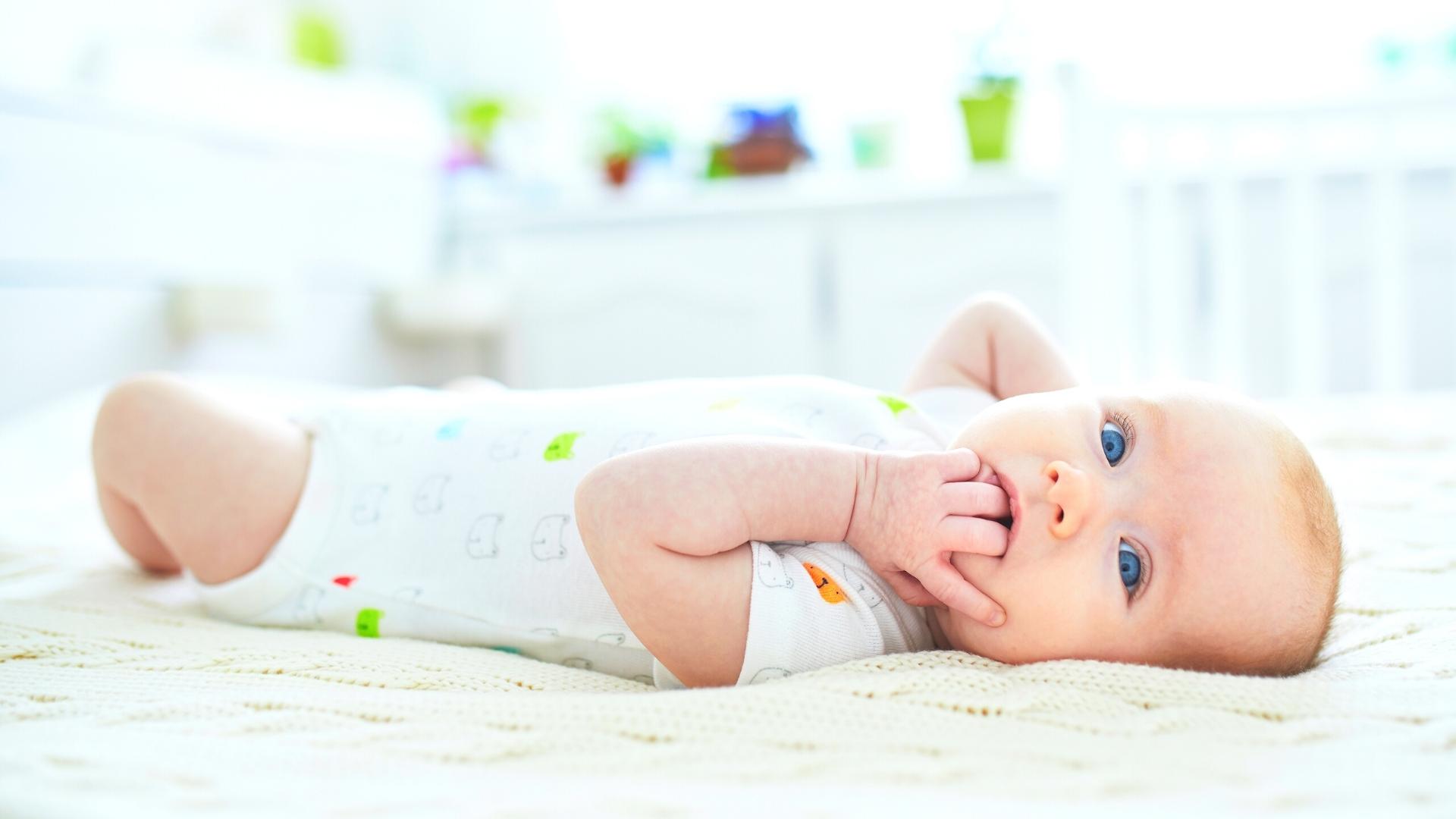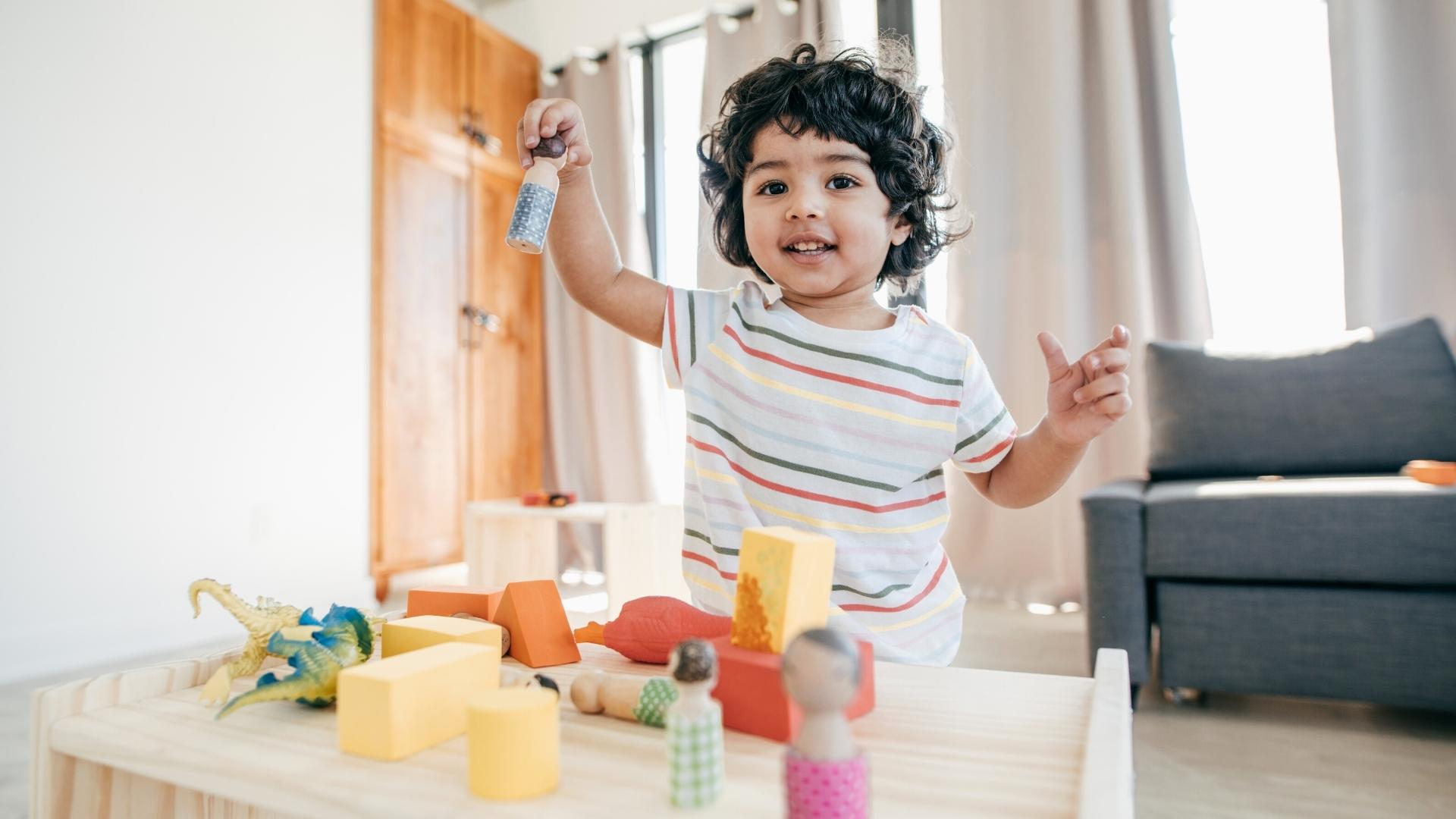Over the years, I have heard many parents ask me “My toddler won’t play with others… Is something wrong?” and the truth is… Social development is a complex part of your child’s life and there is a lot going on in their brain during the early years that will impact their decisions to interact with others.
My Toddler Won’t Play With Others
Depending on the age of your toddler, it is quite normal for them not to play with other children. This is because you are the main focus of your toddler’s life. Only later will other children start to become interesting to your toddler, but even then they may not want to play with them immediately.
How Does Social Development In Toddlers Work?
Social development and the stages of play typically follow the same path, but children will progress through it at different rates.
0 to 2 Years
For the first 18 months of life, familiar people are the main focus of a child’s life. They may find other children fascinating but they will be more emotionally attached to significant adults in their life, like you, their grandparents, aunts and uncles.
Then, between 18 months and 2 years, your toddler will start to notice other children but not engage in cooperative play with them. They will prefer to remain solitary in their play sessions.
2 to 3 Years
At 2 and 1/2 years old, your toddler will now play alongside other children. This is known as parallel play and it is an important part of your toddler’s social development where your toddler will play alongside one another, often engaging in the same type of play…
But not playing together.
However, by 3 years of age, children will start to play with each other and separate from their parents quite easily. They will copy each other and start to take turns in games.
This is known as associative play.
4 to 5 Years
4 year olds will be well on their way to playing cooperatively by now and they will prefer to play with others rather than alone.
Then finally, by 5 years old, your child’s friendships will begin to influence the way they behave. They will want to be liked, will want to please their friends and will become excited at the prospect of spending time with them.
This social development will continue throughout your child’s life and will never really end.
Emotions, likes, dislikes, friendships and life experiences will all play a role in social development as your child grows into teenagehood and adulthood… This is just the beginning!
Looking to get your little one to sleep quickly and effortlessly? Check out my Bedtime and Nap Cheat Sheet and master the art of making daytime naps and bedtimes as seamless as possible.
A bedtime & nap cheat sheet so good your little one will ask you to put them to bed...
Laura Williams "This is a life saver! I'm so glad I downloaded your bedtime & nap cheat sheet. My little one actually asked me to put him to bed last night! Unbelievable! Thank you so much!"
Click Here For The FREE Cheat Sheet
When Should You Be Concerned That Your Toddler Is Not Playing With Others?
So, as you can see… social development is a relatively slow process.
It is closely linked to emotional and cognitive development and understanding how our fellow humans function and feel about us is a lifelong lesson in which our social experiences in early childhood can hugely influence how we function socially later in life.
Obviously, the way in which we socialise varies from person to person and the same is true for children.
Some are naturally more confident while others are shyer.
Both are perfectly normal but for a shy child, learning how to socialise can be harder.
Play is a very important part of child development, especially social development… So let’s deal with your child not playing with others by age and see if there really is a problem that you should be worried about:
My Toddler Won’t Play With Others At 2 Years Old
I would not worry if your 2 year old won’t play with others. 2-year-olds tend not to play with others but rather parallel play alongside other children.
Expecting your child to play with others at this age is something that most are not developmentally ready to do.
However, offering your toddler plenty of opportunities to spend time around other children is great for this age group, as it sets them up for the next stage in their social development.
My Toddler Won’t Play With Others At 3 Years Old
This is the age at which associative play really starts to kick in. But it is also the age at which toddlers may start to become wary of strangers…
So, if your 3-year-old is reluctant and won’t play with others… You can help by joining in with the play too.
If your little one sees you interacting with other children they will get the message that it is safe for them to join too and it will give them more confidence to interact with their peers.
REMEMBER: At this age, children will not be playing cooperatively, but will copy what others are doing. For example, if one child runs, they may all start. So don’t worry too much about the games they play together.
My Toddler Won’t Play With Others 4 Years Old
By now, I would expect your toddler to be more interested in cooperative play and want to interact with other children their own age.
So, if your 4 year old won’t play with others and is struggling to socially connect then you may need to take the pressure off.
- Planning playdates at home where they feel comfortable and confident is a good place to start.
- Come up with some structured activities and discuss beforehand what they would like to do. This means they don’t have to rely on any spontaneous play which is often difficult for a reserved or shy child.
- Setting up activities like water play, sand play, painting, play dough or cooking together are great for these occasions. They require cooperation and you can be there on the sidelines to offer encouragement.
My Toddler Won’t Play With Others At 5 Years Old
If your 5 year old won’t play with others and is struggling to fit in socially, then they are probably suffering from a lack of confidence or shyness.
If this is part of their natural personality then you will need to spend a lot of time reassuring them that they are doing OK.
Having said all this, if your child is still upset by the idea of being apart from you at 5 years of age and won’t interact with others, even one well-known friend despite you trying your best…
It may be a good idea to consult with your doctor just to ensure that there are no underlying developmental issues that need to be addressed.
REMEMBER: Do not label your child as shy and as Alyson Schafer agrees, do not try and force them into a situation where they feel uncomfortable.
16 Ways To Improve Your Toddler’s Social Skills
Your toddler will learn how to play from you. That is why playing with your baby is so important!
You will be the first person to teach them how to share, take turns, be kind and cooperate with others.
As a parent, you can help your toddler get ready for social play by teaching and guiding them through the basics of social interactions when it is age-appropriate.

1. Teach Them How To Share
As they grow, you can encourage your toddler to share their toys with you or their siblings and it is also important that they see you sharing with others too.
When they share successfully (which isn’t always easy for them!) you should praise them enthusiastically.
An ideal board book to help your toddler with the concept of sharing is Sharing Time By Elizabeth Verdick.
2. Show Them How To Take Turns
As with sharing, you can start to play simple games that involve the two of you taking turns.
A simple first game for toddlers that is easy to play and a great way to start your toddler on the sharing journey is Peaceable Kingdom’s Monkey Around Game. This game does not take long so there is no chance of your little one getting bored but playing this together will definitely help your toddler learn how to take turns and cooperate in a joint task.
Engage with your child through simple and playful Monkey-ing Around fun to boost their gross motor skills, hand-eye coordination, imitation, vocabulary and social-emotional skills!
TOP TIP: Sharing and taking turns can be difficult for toddlers (especially under the age of 3!) so expect some setbacks and be prepared to step in and negotiate.
3. Teach Them To Be Kind To Others
This is an essential social skill and involves your toddler learning about empathy and understanding their own emotions too.
A young child who has been encouraged to be kind is more likely to be successful when playing and socialising with others.
4. Arrange Playdates Where You Can Watch And Supervise
Arranging playdates even before your little one can play ‘with’ others… will get them used to being around other children and adults.
Playdates at home on familiar territory will make it easier for your child to practice their social skills. Here are some great toddler activities to try -> Activities For 18 Month Olds.
5. Get Out And About
Take your child out and let them see the world. Even if they just want to observe, give them plenty of opportunities to watch other people socialise.
6. Encourage Them To Use Their Imagination
Young children love to play make-believe and it is an important part of their social development as they practice grown-up situations.
Encouraging your little one to engage in imaginative play with you first will set them up to feel confident to do so with their peers later on.
7. Teach Them To Have Good Manners
An essential social skill is having good manners. Model good manners to your little one, even before they can talk. Again, watching you will be the best way for them to learn this essential social skill.
8. Provide Opportunities For Them To Play Alongside Others
If you can provide opportunities for your child to play alongside others without the pressure of joining in, it is a great help.
Visits to the park, and attending playgroups or mother and toddler groups are great for this!
9. Talk To Them About Situations That They Find Intimidating
It is important to acknowledge your child’s emotions in a social situation that they may be struggling with. Once they are old enough to vocalise what they are feeling, talk about why they may be uncomfortable and offer them ways to feel better.
Listening to your children will give you valuable insight into their world.
REMEMBER: Never make your toddler feel strange or odd about not wanting to join in.
10. Show Them How To Greet People
Knowing how to greet others is another important social skill and again, one they can learn from you.
If they can comfortably say ‘hello’ and tell people their names, it can often be an ice breaker and make it easier for them to start up a conversation.
11. Be Confident and Calm When Introducing Them To New Situations
If you know your child is anxious about new social situations then you need to be full of confidence! This can be quite tough if you are worried about how your child is going to behave but try your best to show them you are not concerned.
Fake it until you make it and your toddler will feel better about a situation if you are OK with what’s heppening too.
12. Let Them Survey The Room and Socialise At Their Own Pace
It is always fine to let your little one survey the room first. Never force your child to take part and if they are reluctant, you can make the first move and join in the play with them.
With you by their side, they are more likely to have a go.
13. Find What Social Activities They Feel Most Comfortable With
Another great way to improve your child’s social skills is to find what social activities they feel the most comfortable doing.
If they enjoy painting or crafting then make or find opportunities for them to do these activities with other children. If they enjoy swimming, for example, enrol them in a swimming class.
Here are some great outdoor activities for you and your little one to try -> Outdoor Activities For Toddlers!
14. Don’t Make Your Child Stand Out
Children do not like to be different. They want to be like their peers.
One way to ensure this is to dress them like other children. You may have a unique dress style that you want to pass on, but they will not want to attract attention, so keep things simple.
15. Talk To Daycare Leaders And Teachers
If you are concerned about how your child is behaving socially at daycare or preschool then talk to their carers or teachers about how they are doing when away from you to decide if any course of action is to be taken.
16. Teach Them Cooperation
Another important social skill is cooperation. Teach your child cooperation in the home by making them help clear away toys and tidy up.
They can also help you around the house! Again, you are their best role model and if they see you cooperating with others they will follow suit when playing with their peers.
Frequently Asked Questions About “My Toddler Won’t Play With Others”
Here are some common questions that I get asked about why my toddler won’t play with others:
Why Does My Child Not Want To Play With Friends?
Put simply… some children just like to play alone and do not need to spend time mixing with others.
However, there is a lot to be learnt from associative play and you should try to encourage, but not force, your child to play with others if it is age-appropriate.
Inviting one friend around to play is a great way to start developing your child’s social interaction. From these one-on-one interactions, your toddler can learn how to read social signals and become aware of other children’s feelings, likes and dislikes all within the safety of their own home.
As always, lead by example.
Show them how to be kind, listen to others and take turns. If they really don’t want to spend a lot of time with other children, you and the extended family will be where they will learn their social skills!
What To Do If A Child Refuses To Participate In An Activity?
If your toddler refuses to participate in an activity… Let them watch and do not make them feel bad about not taking part.
They may really enjoy being an observer and you could do more harm than good by trying to force them to take part.
Gentle encouragement should be your main plan and if they are old enough, find out what they don’t like about the activity. Maybe it is too noisy, too scary or just too busy.
Ultimately, if your child does not want to take part then let it be.
My Toddler Won’t Play With Others Recap
Remember, there are lots of ways that you can help your toddler develop their social skills depending on their age.
But the most important thing to remember is…
You are their best role model and making your toddler feel safe and loved whilst instilling a strong sense of self will help them on their social development journey towards playing with others.
Need More Parenting Help?
- Download our FREE Bedtime & Nap Sleep Cheat Sheet. It’s a free, easy-to-use and proven formula designed for parents of 0-5 year olds to master the art of consistently undisturbed and restful sleep without the yelling, nagging or exhausting long-winded evenings.
- Check out our Parenting Toolbox. You’ll get access to expertly-chosen products that you can guarantee are the best for your little one and your wallet.
- Are you looking for personalized guidance to navigate the challenges of parenting? I offer 1-on-1 consultations to bring you tailored strategies and actionable advice to help support your child's growth and well-being with confidence.

A bedtime & nap cheat sheet so good your little one will ask you to put them to bed...
Laura Williams "This is a life saver! I'm so glad I downloaded your bedtime & nap cheat sheet. My little one actually asked me to put him to bed last night! Unbelievable! Thank you so much!"
Click Here For The FREE Cheat Sheet




